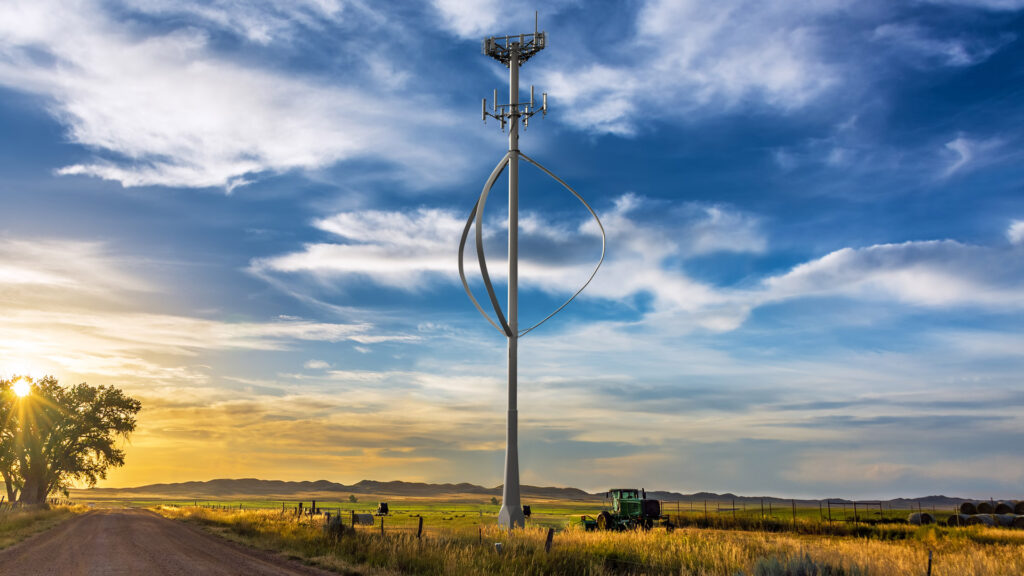Believe it or not, over 75% of the U.S. still has little or no broadband communications coverage. Even moderately rural areas lack the demand to justify expensive new towers, and difficult terrain in large parts of the country make the needed infrastructure even more prohibitive.
Aradatum, a telecommunications startup based in Brighton, Michigan, just outside Detroit, wants to help change all that. They’ve designed a fully self-contained, self-sufficient and easily-maintained 5G tower with an eye specifically toward those areas where standard towers don’t make sense. “The Aradatum play is to go into those areas where the technology falls short,” said Larry Leete, the company’s president. Aradatum’s technology consists of a 150-foot 5G tower with an integral vertical-axis wind turbine, as well as solar panels and vanadium redox flow energy storage batteries. The system also has a backup clean propane electrical generation system.
A wholly-owned subsidiary of holding company CGE Energy, Inc., the Aradatum concept was self-funded since 2012, and was officially launched in March 2020. February 2021 marked the opening of the company’s seed round, which closed at $10 million last July. Aradatum has since raised a further $5 million.
The company sees unique opportunities in providing broadband coverage while also supplementing the electrical grid, for applications that include communications, farming, autonomous vehicles, telemedicine, and even esports. “The pandemic drove everyone out of the cities, away from the ‘zombie apocalypse,’” Leete said. “They went to places like New Hampshire, Vermont, Idaho and Montana. Meanwhile, Industry 4.0 is coming to rural areas with things like John Deere’s new autonomous tractor, but lots of farms don’t have broadband access. You don’t see cell towers in farm fields. And the electrical grid wasn’t designed to support all this–it was designed in the 19th century to turn lights on and refrigerate food. It can’t support the tech we have now.”
Aradatum is aiming at solving all those infrastructure shortcomings in one fell swoop. “We provide connectivity and electricity in one tower,” explained Leete. “Our goal is not to impact the grid at all. It costs $400,000 per mile to connect to the grid. We eliminate those costs. We go anywhere. And we create a secondary grid.” The base of the tower is designed around standard shipping containers, with a modular design for fast assembly, and minimal site preparation requirements. The tower itself can be raised and lowered hydraulically, to allow all service work to be done from the ground. The company holds six patents on its technologies, with more pending.
Aradatum guarantees 99.999% uptime for its broadband, and backup power at two times the required load. The estimated installation time is one week. Production costs for each tower have not been finalized, but a standard tower costs around $250,000. Aradatum allows customers to avoid those capital costs with its business model of leasing its capabilities for all the services mentioned above.
The company has already partnered with some big names. Mahle Group assisted in development and early engineering. Roush Industries did further engineering and manufacturing work. And Caterpillar has joined forces with Aradatum for their installation and service.
Phase one for Aradatum’s anticipated build-out is domestic. “Telecomms carriers need 300,000 more towers,” Leete said. “Aradatum is after the 8% to 10% where their standard towers can’t go.” Rural wireless Internet Service Providers are another potential customer, as are edge data centers, government entities, and tribal nations.
International applications are Aradatum’s phase two. “Global is a big opportunity,” said Leete. “Developing countries can use our technology to bypass their grid build entirely.” Faster-growing international markets for autonomous vehicles represent another potential customer base, with needs for both telecommunications and power to support them. Aradatum also sees African businesses and banking as a particular opportunity, since their business models are already so heavily based on mobile platforms.
It all comes down to filling in the gaps–gaps that a lot of people aren’t even thinking about. “Infrastructure is what’s critical in all this, to take America from what it is to what it can become,” said Pete Price, Head of Eco-System Alliances at Aradatum. “Everyone is focused on tech, not on infrastructure.”
“The last mile is where the headaches are,” added Leete. “That’s where we come in.”



